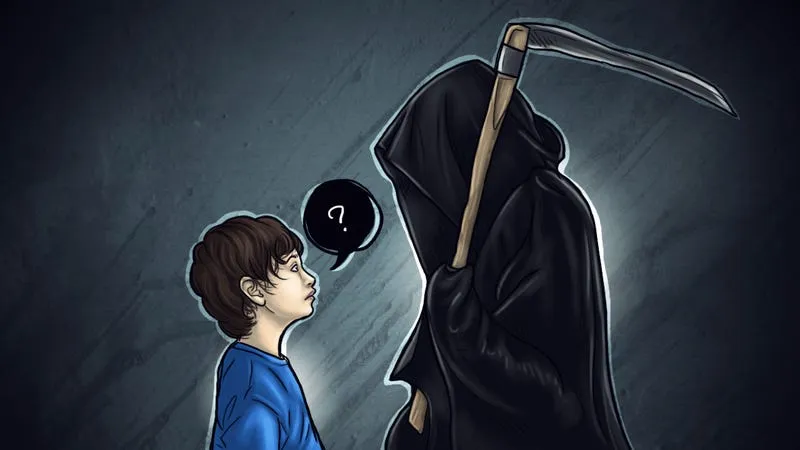How children understands death:

Death is not an easy subject, especially when it comes to children, but it is also not a foreign concept for them. They hear people talk about it and from a very early age see it on television, even in cartoons and comedies. They tend to ask questions about it and do not fully understand it before a certain age. As in the case of all behaviors, the uniqueness of the individual also determines his/her reaction towards death and dying.
Specific factors that have been found to play a role in children's understanding of death include age, the level of cognitive development, nature of the relationship with the person who died, cultural influences and the way parents communicate with their children about death.
My 6 year old son has been very curious about death the past few months and the way I had to bring the message of death across, was to show him an actual dead bird, for him to fully understand, but the concept of death develops in the same way as other concepts, namely increasingly with age. However, there may be important differences:
Some children understand death at the age of five, others only at 12 years of age.
Once your body is dead, it cannot ever be alive again. Kids under 3 don’t understand this idea; they’ll talk about dead people as if they went on a trip or took a nap, or will hold open the possibility that dead things can come back to life with the help of water, food, medicine, or magic. Children begin to grasp death’s finality around age 4. In one typical study, researchers found that 10 percent of 3-year-olds understand irreversibility, compared with 58 percent of 4-year-olds.
The following is an outline of children's concepts of death at different ages. This could be seen as averages and should be interpreted with extreme caution as it only provides a very broad guideline:
Ages 0 - 2:

Infants do not recognize death, although they do experience feelings of loss and separation when someone significant dies. This may lead to responses such as constant crying, irritability, listlessness, quietness, unresponsiveness, weight loss and disturbed sleeping and eating patterns.
Ages 3 - 5:

Children in this age category do not fully separate death from life and may believe that the deceased continues to live (e.g. in the ground where he or she has been buried). As they do not understand the concept of 'forever', they tend to consider death as a temporary or gradual event. It is common for them to ask questions like: "When is grandma coming back?", "How will grandma eat or go to the toilet under ground?". They could also respond to the emotional reactions of parents and siblings by crying or throwing tantrums.
Ages 6 - 9:

Children of this age often become curious about death, asking very concrete questions, for example, on the decay of the body. Death is personified and takes on a specific identity such as a skeleton or a ghost. They also think that death happens to other people and especially to the elderly, but not to themselves or their family members. They may also perceive death as a form of punishment and the behavior of grieving children of this age varies from refusing to attend school, headaches or stomach-aches, aggressiveness, social withdrawal, becoming overly dependent (clinging) and overly considerate concerning the well-being of others.
Ages 10 - 18:

By the time children reach the age of 10 they usually understand that death is inevitable: "Everyone will die one day, even I". They also realize that death is final and cannot be changed. How they are seen and judged by their friends is very important to them - boys could fear that expressing sad feeling like crying might be seen as a sign of weakness and are afraid to appear different. Girls could also react in a dramatic and intense way to death - responses such as sleeping and eating problems, impulsive behavior and loss of interest in external activities are typical.
Children's grief may look different from that of adults, but is shares fundamental similarities, such as a physical and emotional reaction to the loss of a significant loved one. However, a child will grieve in his or her own unique way, and it is essential that adults do not dictate or inhibit that process. Instead, a child's expression of grief should be allowed and even facilitated.

Resource: https://umb-eap.org/wp-content/uploads/pdf/DeathByAgeGroup.pdf
